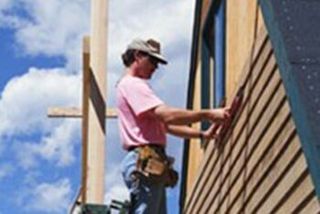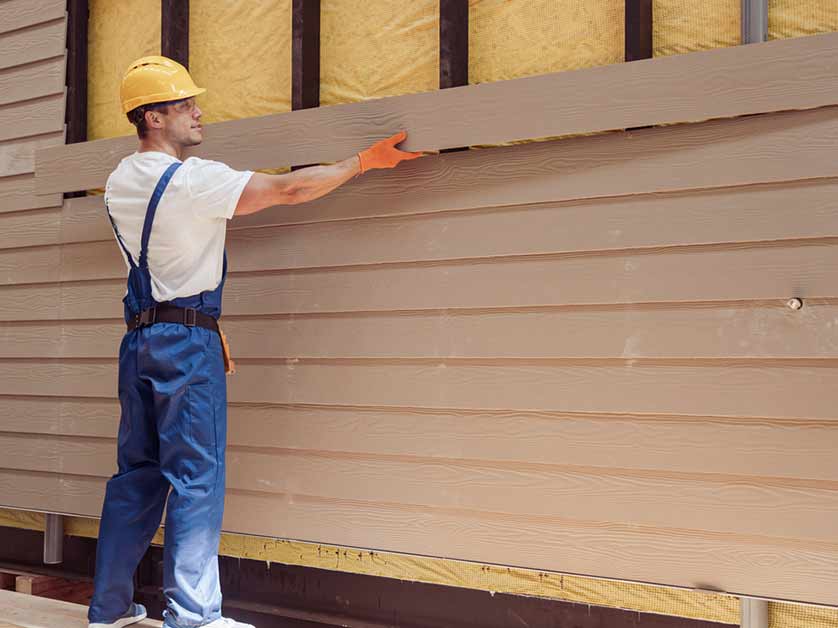Your Go-To Morris Siding Contractor for All Residential Siding Needs
Your Go-To Morris Siding Contractor for All Residential Siding Needs
Blog Article
The Important Overview to the Numerous Types of Home Siding and Their Unique Benefits
In the realm of home enhancement, picking the best siding is a crucial choice that influences both visual charm and practical performance. With so several options to consider, which house siding product really stands out for your specific task?
Wood Exterior Siding
Timber house siding, a popular choice for residential outsides, provides a classic aesthetic that integrates natural beauty with structural stability. This house siding product is offered in numerous designs, including clapboard, tiles, and board-and-batten, permitting house owners to tailor their appearance to match their design choices. Wood exterior siding is normally crafted from durable species such as cedar, redwood, or pine, which are understood for their strength and capability to endure environmental stressors.
One of the main advantages of wood house siding is its superb insulation homes, which can contribute to energy performance and lower heating costs. In addition, wood house siding is naturally degradable, making it an eco pleasant alternative when sourced sustainably. Routine maintenance, including painting or staining, can extend its lifespan and boost its appearance, permitting house owners to preserve the all-natural beauty of the wood.
However, possible downsides include vulnerability to parasites, rot, and weather condition damages, requiring ample treatment and maintenance - morris siding contractor. In spite of these issues, when appropriately taken care of, wood home siding can provide a attractive and resilient service that improves the personality of a home while offering a warm, inviting atmosphere

Vinyl Exterior Siding
Vinyl siding has actually arised as a leading choice for house owners seeking a low-maintenance outside choice that incorporates toughness and cost. This versatile material is crafted from polyvinyl chloride (PVC), making it resistant to numerous climate conditions, including wetness and UV rays. Consequently, vinyl house siding does not warp, rot, or fade, making certain resilient aesthetic allure.
One of the primary benefits of plastic house siding is its comprehensive variety of styles and colors, permitting property owners to achieve the wanted try to find their home without the need for regular repainting. In addition, plastic house siding is very easy to mount, which can substantially lower labor prices throughout building or improvement projects.
Vinyl siding additionally contributes to energy efficiency. Several options feature insulation backing, which improves thermal performance, assisting to preserve comfy indoor temperature levels and possibly decreasing power costs. In addition, its smooth surface helps with simple cleaning, requiring just periodic washing with a yard pipe to get rid of dirt and debris.
Fiber Concrete Home Siding
Fiber cement house siding has obtained grip amongst building contractors and homeowners alike as a result of its amazing mix of longevity and visual convenience. Made up of a mix of cellulose, sand, and cement fibers, this siding choice is engineered to withstand extreme weather, including high winds, heavy rainfall, and temperature level variations, making it a resilient option for domestic outsides.

Among the key benefits of fiber concrete exterior siding is its resistance to pests, such as termites, and its non-combustible nature, offering improved fire safety and security. morris siding contractor. Additionally, it is available in a vast array of designs, colors, and textures, permitting property owners to accomplish their wanted visual without sacrificing performance
One more benefit is its reduced maintenance requirements; fiber cement house siding commonly needs painting or websites staining every 5-10 years, which is less regular than other materials. Additionally, its longevity contributes to a reduced total price of possession, as it reduces the demand for frequent repairs or replacements.
Ultimately, fiber cement exterior siding represents an exceptional financial investment for those seeking a durable, eye-catching, and functional exterior alternative, incorporating both kind and feature to improve the home's visual allure.
Metal Home Siding
The attraction of metal exterior siding lies in its robust resilience and modern-day aesthetic appeal, making it a popular option for contemporary style. Available in materials such as light weight aluminum and steel, metal siding supplies a series Find Out More of coatings and colors, enabling house owners to attain a customized appearance that complements their design vision.

Energy effectiveness is another substantial advantage, as many metal home siding items are developed with insulation alternatives that assist manage indoor temperatures. This can bring about decreased energy prices over time. Furthermore, steel siding is frequently recyclable, making it an eco-friendly choice for sustainability-minded home owners.
The setup procedure for steel house siding can be fairly simple, resulting in a quicker turn-around time for construction jobs. Generally, steel house siding integrates functionality and design, making it a sensible alternative for those seeking a long-lasting and visually appealing exterior surface.
Brick and Stone Exterior Siding
Block and stone house siding stands apart as a classic selection that enhances the aesthetic appeal of any kind of home. Understood for their durability and low upkeep, these products provide a remarkable return on investment while boosting the residential property's curb appeal. Offered in various colors, structures, and patterns, block and stone can be customized to suit varied architectural designs, from traditional to modern.
Among the key benefits of brick and stone exterior siding is their energy performance. Both materials have all-natural insulating residential or commercial properties that aid regulate interior temperatures, possibly lowering heating & cooling prices. Furthermore, they use exceptional fire resistance contrasted to other exterior siding alternatives, contributing to improved safety and security.
An additional advantage is their long life. Brick and stone can last visite site for years, usually calling for very little upkeep beyond occasional cleaning. Unlike timber exterior siding, they are impervious to bugs and rot, making sure a resilient outside that holds up against the aspects.
Verdict
In summary, the choice of siding significantly influences a home's aesthetic appeal, energy efficiency, and maintenance needs. Each kind of home siding-- whether timber, plastic, fiber steel, block, or concrete and stone-- offers special advantages tailored to various homeowner preferences and environmental conditions. Recognizing these options allows informed decisions that improve both the longevity and aesthetic beauty of residential exteriors. Inevitably, picking the ideal house siding is crucial for accomplishing a balance in between capability and design in domestic style.
One of the primary benefits of timber siding is its outstanding insulation buildings, which can contribute to power performance and lower home heating prices. Additionally, wood exterior siding is naturally degradable, making it an ecologically pleasant choice when sourced sustainably.One of the main advantages of metal home siding is its resistance to numerous environmental aspects.Energy effectiveness is another considerable benefit, as many steel exterior siding items are designed with insulation alternatives that assist regulate interior temperatures. Each type of house siding-- whether timber, plastic, fiber cement, brick, or metal and rock-- uses one-of-a-kind advantages customized to various property owner preferences and environmental problems.
Report this page